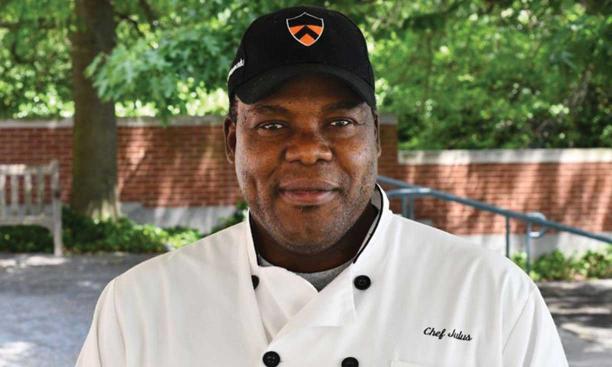
Despite the eerie quiet that now envelops Princeton’s campus, about 750 staff, faculty, and graduate students continue to report for work. Many who fall into this category are unionized hourly workers — including employees working in dining, building, and mail services — and navigating the new normal during the coronavirus pandemic has required new ways of doing business.
Bill Hallahan, assistant director of Print and Mail Services, said that while there was a notable interruption in deliveries, “we still were able to come through, I would say [with] 99 percent of what we were asked to do.”
To reduce the number of mail carriers walking around campus, the department shifted the Frist Campus Center package and mail room into a hub for students and offices to pick up mail and made use of the lockers for those who receive packages. While these measures eliminate most needs to deliver mail on campus, in other cases, the transaction is arranged so that it’s touchless.
Mail service is essential, Hallahan said. “We’re supplying things that could be life-sustaining, if you will, to these students who are stuck here,” he added, noting that deliveries can include medication, food, and bills.
In Facilities and Housing, a group of 22 employees received special training so they can support students who are in isolation and quarantine. Employees from Campus Dining are also among those remaining to cook and package food, so students can pick up their meals in the dining halls. They are creating food and care baskets for students in self-isolation.
“It’s been my honor to be here and help feed those who are on campus with us,” chef Julus Charles wrote in an April newsletter to students.
Richard Wilder, senior storage facilitator of Building Services and vice president and treasurer of Service Employees International Union (SEIU) Local 175, said the union reached an agreement with the University to reduce the number of staff on campus at any one time. Most areas will operate with 25 percent of staff at a time (on a rotating schedule), except the Building Services staff, which will operate with 50 percent. University spokesman Ben Chang told PAW that all staff will be paid whether at work or not.
Safety is the top priority, Wilder said, noting he’s received various questions and concerns. “The element of fear, that’s the hardest thing to get over,” he added.
Essential employees are being provided with the proper protective equipment needed for their jobs, extra attention is being focused on disinfecting high-touch surfaces, and areas where infected people may have been are being deeply cleaned, said Robin Izzo, executive director of environmental health and safety, during a virtual town hall meeting with staff in April. She added, “Everyone needs to be able to do their job while being at least 6 feet from each other.”
As of April 22, 47 students (three on campus) and 27 employees tested positive for COVID-19. Alerts are being sent to work teams through the system used to place work orders so they are aware of areas potentially exposed to the coronavirus, Wilder said. Managers will have to assess the situation before any workers are allowed to enter an affected area. He also noted that some managers have received hazmat training.
University spokesman Michael Hotchkiss told PAW that the University is working with offices, departments, and individual employees “to ensure critical campus functions continue while limiting the number of employees on campus and creating an environment that facilitates social distancing for those who are on campus.”
